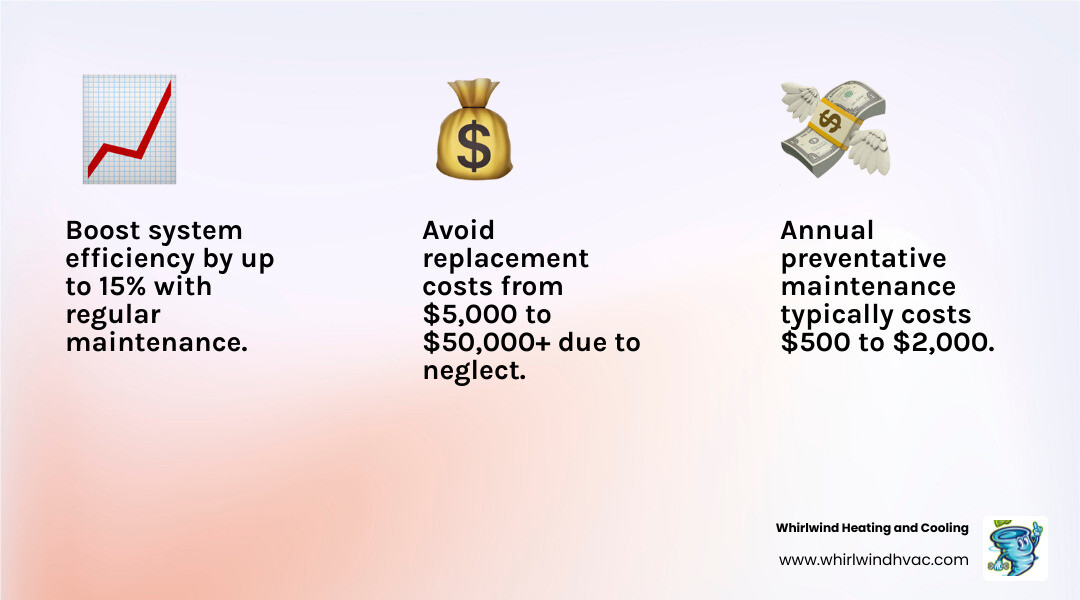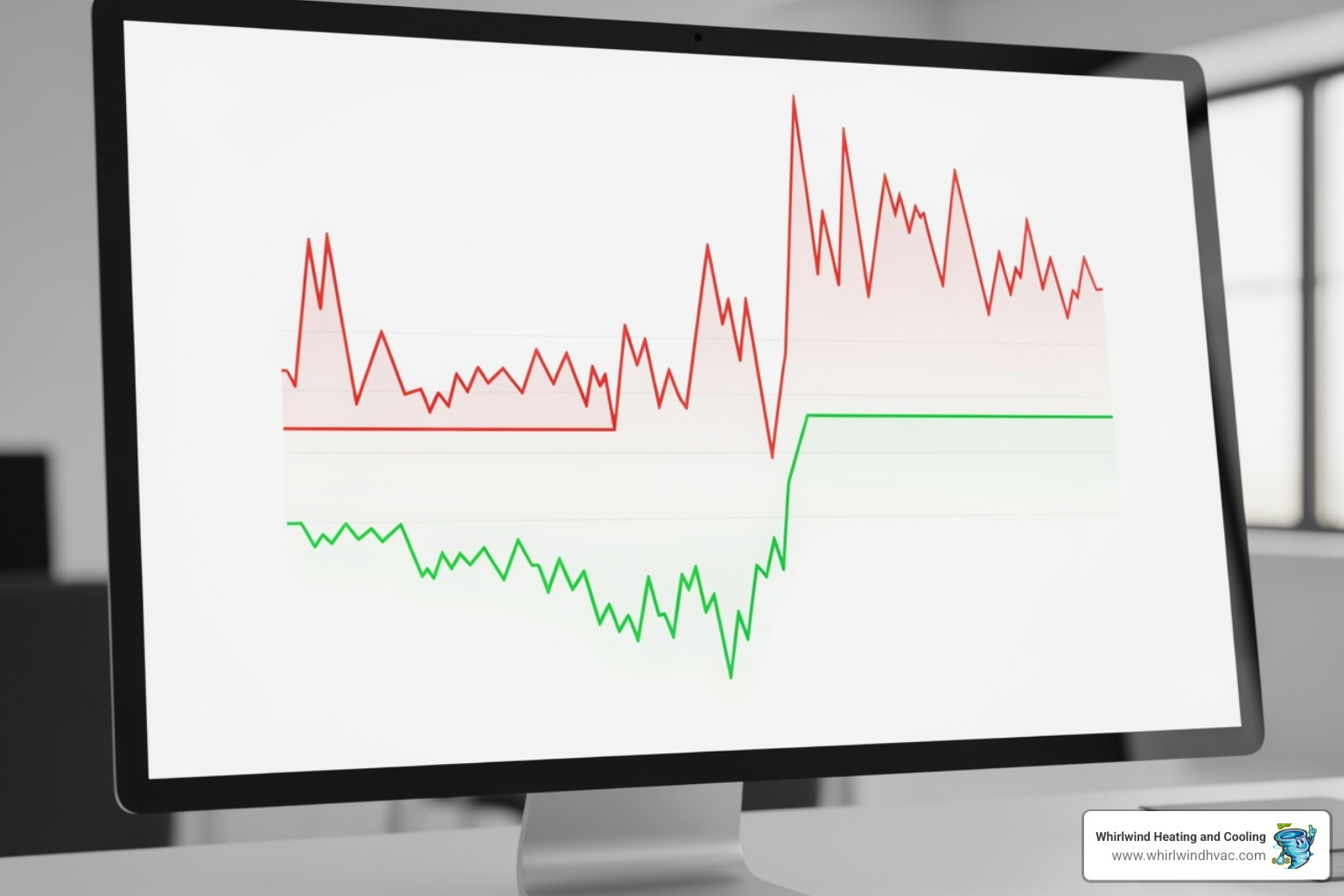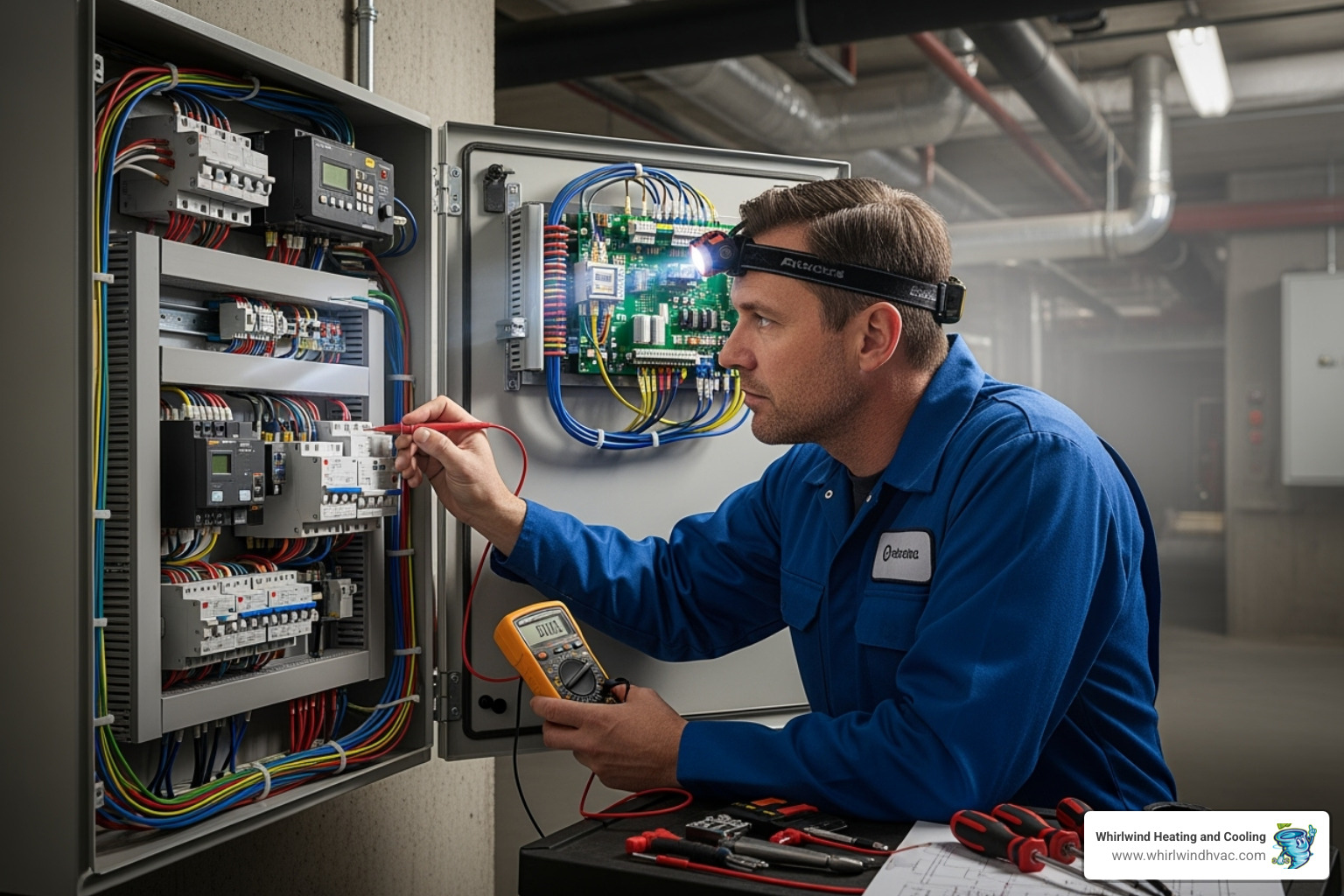Why Commercial HVAC Maintenance Matters for Your Business
Commercial HVAC maintenance is the systematic inspection, cleaning, and servicing of heating, ventilation, and air conditioning systems in commercial buildings to ensure optimal performance and prevent costly breakdowns.
Key Components of Commercial HVAC Maintenance:
- Filter replacement – Every 1-3 months depending on usage
- Coil cleaning – Condenser and evaporator coils annually
- System inspections – Electrical connections, moving parts, controls
- Refrigerant checks – Levels and leak detection
- Seasonal tune-ups – Heating preparation in fall, cooling prep in spring
Your commercial HVAC system accounts for 17-40% of your building’s total energy usage – making proper maintenance one of the most impactful investments you can make. Research shows that businesses typically spend $500 to $2,000 annually on preventative maintenance, but this small investment can improve system efficiency by up to 15% through simple tasks like filter replacement.
The stakes are high when commercial systems fail. Unlike residential units, commercial HVAC breakdowns can mean:
- Customers leaving due to uncomfortable conditions
- Employees unable to work productively
- Sensitive equipment damage from temperature fluctuations
- Product spoilage in temperature-controlled environments
With commercial HVAC replacement costs ranging from $5,000 to $50,000 or more, regular maintenance isn’t just about comfort – it’s about protecting your business operations and bottom line.
Now that we understand the foundational importance, let’s dive deeper into why this proactive approach is not just a good idea, but an absolute necessity for any business.
Why Regular Commercial HVAC Maintenance is Essential
Imagine your AC failing on the hottest day of summer with a business full of customers. This scenario is a real risk, but regular maintenance can prevent it. Skipping commercial HVAC maintenance is like skipping oil changes in your car—it leads to eventual, costly failure at the worst possible time.
The benefits of proactive care are immediate and long-lasting:
- Lower energy bills: A well-maintained system uses up to 15% less energy.
- Fewer repairs: Catching small issues early is far cheaper than fixing major breakdowns.
- Extended equipment lifespan: Properly cared for systems can last 15-20 years, protecting your investment.
- Improved indoor air quality: Clean filters and coils create a healthier environment for employees and customers.
- Minimized downtime: Reliable systems keep your operations running smoothly without surprise shutdowns.
For deeper insights into these advantages, our guides on the Benefits of Regular AC Maintenance and AC Maintenance Impact on System Efficiency provide even more detail.
The High Cost of Neglect
Skipping commercial HVAC maintenance invites serious financial pain.
- Unexpected breakdowns: Failures always seem to happen at the worst time, costing you real money in lost sales and productivity.
- Premature system replacement: A system that should last 20 years might fail in 10 without proper care, leading to replacement costs of $5,000 to $50,000 or more.
- Reduced efficiency: A neglected system works harder and uses more energy, increasing your monthly utility bills.
- Unhealthy environment: Dirty filters and ductwork can circulate mold, dust, and allergens, affecting health and productivity.
The Tangible Benefits of a Proactive Approach
Taking a proactive stance toward commercial HVAC maintenance delivers measurable benefits.
- Energy savings: The savings on your utility bills can often pay for the maintenance itself.
- Cost predictability: Budget for known maintenance costs and avoid surprise repair bills that disrupt your finances.
- Tenant comfort and employee productivity: Comfortable employees are more productive, and comfortable customers are more likely to linger and spend.
- Safety: Regular checks catch potential hazards like gas leaks, electrical faults, and carbon monoxide issues before they become dangerous. At Whirlwind Heating and Cooling, we believe in doing it right at a fair price – and that includes keeping your people safe while keeping your system running efficiently.
The Ultimate Commercial HVAC Maintenance Checklist
A thorough commercial HVAC maintenance plan optimizes performance and extends equipment life. This checklist covers the essential steps our technicians perform to keep your system in prime condition.
This checklist is your system’s health checkup, catching small problems before they become major issues. We’ve organized tasks by timing: year-round and seasonal.
General & Year-Round Maintenance Tasks
These foundational tasks form the backbone of effective commercial HVAC maintenance.
- Inspecting and replacing air filters – This simple task improves efficiency by up to 15%. Check filters every 1-3 months, as dirty filters force your system to work much harder.
- Checking thermostat settings – We ensure thermostats are calibrated and programmed for your business hours to save energy when the building is unoccupied.
- Tightening electrical connections – Loose connections cause system failures and create fire hazards. Our technicians inspect all wiring to keep your system secure and safe.
- Lubricating moving parts – Motors and fan blades require lubrication to reduce friction and prevent overheating, especially in older systems.
- Cleaning condenser and evaporator coils – Dirty coils kill efficiency. Cleaning these heat-exchange components improves performance and lowers energy bills.
- Clearing condensate drain lines – Clogged drains cause water damage and mold growth. We clear them to prevent moisture issues.
- Inspecting ductwork for leaks – Leaky ducts waste energy by losing conditioned air. We inspect ductwork to find and seal these leaks.
- Testing system controls – We test safety features and operational sequences (start, run, shut-off) to ensure your system operates reliably and safely.
- Monitoring overall system operation – Our technicians spot strange noises, odors, or irregular operation that signal developing problems.
For a deeper understanding of what goes into keeping your system running smoothly, explore our guide on What Preventive Maintenance on Your HVAC System Involves.
Seasonal Commercial HVAC Maintenance: Cooling Season (Spring/Summer)
As temperatures rise, preparing your cooling system prevents mid-summer breakdowns.
- Checking refrigerant levels – Low refrigerant indicates a leak and prevents effective cooling. Running the system low can damage components.
- Inspecting fan motors and blades – We check the outdoor unit for wear and damage, lubricating older motors as needed.
- Cleaning the outdoor unit cabinet – Removing accumulated debris improves airflow and prevents the system from overworking.
- Testing system controls – We check components specific to cooling (contactors, relays, capacitors) that work hardest in summer.
- Measuring temperature drop – This measurement across the evaporator coil confirms if your system is cooling air effectively.
Seasonal Commercial HVAC Maintenance: Heating Season (Fall/Winter)
When the chill arrives in the Willamette Valley, proper heating prep ensures warmth and safety.
- Inspecting the burner assembly – In gas furnaces, we clean and adjust the burner for clean, efficient combustion.
- Checking the heat exchanger – This is a critical safety step, as cracks can lead to dangerous carbon monoxide leaks.
- Testing the ignition system – We test the ignition and safety controls to ensure reliable startups.
- Inspecting the flue system – We verify that combustion byproducts vent safely outside, checking for corrosion or damage.
- Measuring temperature rise – This helps us adjust airflow for optimal heating efficiency and even heating.
- Replacing heating filters – Clean filters are crucial in winter for good airflow and indoor air quality.
For additional guidance on winter preparation, check out our 7 Tips to Maintain Heating System.
Planning and Budgeting for Your Maintenance Program
Smart commercial HVAC maintenance requires a strategic plan that fits your business needs and budget. A good plan keeps your operations running smoothly while protecting your bottom line.
A well-planned program makes HVAC costs manageable and predictable, eliminating the scramble to fix unexpected breakdowns during peak business hours.
How Often Should You Schedule Service?
How often do you need service? The answer depends on your situation, but solid guidelines exist for most Willamette Valley businesses.
Semi-annual maintenance is the sweet spot for most commercial systems, with one visit in spring to prep for cooling and another in fall for heating. For heat pumps, which work year-round, twice-yearly service is essential.
Annual maintenance is the bare minimum, suitable only for small offices with light usage. Most commercial operations benefit significantly from the semi-annual approach.
System type, age, and usage intensity also determine frequency. A server room needing constant cooling requires more attention than a retail store. An older system or one running 24/7 may need quarterly check-ins. The complexity of commercial systems—with multiple zones and heavy workloads—makes professional, scheduled maintenance a business necessity. For more industry insights on maintenance frequency, the U.S. Department of Energy’s guide on HVAC maintenance provides valuable recommendations.
Understanding and Budgeting for Maintenance Costs
Understanding the financial side of commercial HVAC maintenance helps you make informed decisions and avoid budget surprises.
Most businesses invest $500 to $2,000 annually in preventative maintenance. Considering that replacement can cost $5,000 to $50,000 or more, this annual investment is a smart financial decision.
Individual service visits typically run between $200 and $500, with hourly labor rates for commercial work ranging from $75 to $150. Several factors influence your final cost:
- System size and complexity: A large, multi-zone system costs more to service than a simple one.
- Age and condition: Older systems may need more frequent attention and parts.
- Geographic location: Climate conditions in the Willamette Valley, from Salem to Portland, can affect maintenance needs.
While costs may rise with inflation, investing in regular maintenance still saves money compared to unexpected breakdowns and premature replacement. View maintenance as an investment, not an expense. For practical strategies on managing these costs effectively, check out our guide on Cost-Effective AC Maintenance Strategies.
What to Look for in a Maintenance Contract
A solid commercial HVAC maintenance contract is your insurance against unexpected breakdowns and budget surprises. Knowing what to look for can save you future headaches.
- Scope of services: The contract should detail every task included, from filter changes to coil cleaning.
- Service frequency: It should explicitly state whether service is semi-annual, quarterly, or on a custom schedule.
- Emergency response times: Look for guaranteed prompt response for emergency calls, ideally with 24/7 availability.
- Parts and labor warranty: The contract should clearly state what’s covered and for how long.
- Transparent pricing: You should receive an itemized breakdown of costs with no hidden fees.
- Customizable plans: The best providers offer plans custom to your specific system, usage, and budget.
- Dedicated account management: For larger businesses, a consistent point of contact who knows your system is invaluable.
The cheapest contract isn’t always the best value. Focus on a provider who offers comprehensive service, clear communication, and fair pricing. Learn more about structured maintenance planning with our HVAC Maintenance Plan.
Recognizing Trouble and Choosing the Right Professionals
Even with the best commercial HVAC maintenance plan in place, problems can still arise. The key is catching them early and having the right team to address them. Think of it like having a good relationship with your doctor – you want someone who knows your system inside and out, responds quickly when issues arise, and treats you fairly.
Telltale Signs Your HVAC System Needs Attention
Your commercial HVAC system is pretty good at telling you when something’s wrong – you just need to know how to listen. These warning signs often appear weeks or even months before a complete breakdown, giving you time to address issues before they become expensive emergencies.
Uneven temperatures throughout your building are one of the most common red flags. If your reception area feels like the Arctic while your conference room resembles a sauna, something’s definitely off. This could point to airflow problems, faulty thermostats, or even refrigerant leaks that need immediate attention.
Strange noises are another clear indicator that your system needs help. While your HVAC should hum along quietly in the background, grinding, squealing, banging, or rattling sounds mean trouble. These noises often signal worn belts, loose components, or failing motors – all things that are much cheaper to fix before they cause a complete system failure.
Don’t ignore unpleasant odors either. A musty smell often indicates mold or mildew lurking in your ductwork or coils, while burning odors could mean electrical problems or overheated components. Both scenarios require immediate professional attention to prevent health hazards or fire risks.
Increased energy bills without any change in your usage patterns are a telltale sign of declining efficiency. When your system has to work harder to maintain the same comfort levels, it’s crying out for maintenance. This is often one of the earliest warning signs that something needs attention.
Watch for frequent cycling too – when your system turns on and off more often than usual. This “short-cycling” wastes energy and puts unnecessary stress on components. It’s usually caused by thermostat issues, improper sizing, or deeper mechanical problems that need professional diagnosis.
Visible moisture or leaks around your equipment should never be ignored. Whether it’s puddles near your indoor unit or water stains around condensate drains, excess moisture can lead to water damage, mold growth, and expensive structural repairs if left unchecked.
For more detailed information on identifying when your system needs professional help, check out our comprehensive guide on Signs You Need Professional HVAC Repair.
How to Choose a Qualified HVAC Provider
When your business’s comfort and productivity are on the line, choosing the right commercial HVAC maintenance provider isn’t just important – it’s critical. You need a partner who understands the unique demands of commercial systems and can respond quickly when issues arise.
Licensing and insurance should be your starting point. Any reputable HVAC company will be fully licensed and carry comprehensive insurance. This protects your business from liability if something goes wrong during service, and it shows the company takes their responsibilities seriously.
Look for NATE certification among the technicians. North American Technician Excellence certification means the technicians have proven their expertise through rigorous testing. These professionals understand the complexities of commercial systems and stay current with industry best practices – something that’s essential when dealing with the sophisticated equipment found in most commercial buildings. You can learn more about NATE at North American Technician Excellence.
Commercial experience matters more than you might think. Commercial HVAC systems are vastly different from residential units – they’re larger, more complex, and often require specialized knowledge of building automation systems, multiple zones, and precise temperature control. Ask potential providers about their specific commercial experience and the types of systems they’ve worked on. A company that primarily handles residential work might struggle with your commercial needs.
Customer reviews tell the real story. Check online platforms like Google and Yelp to see what other businesses say about their service quality, response times, and professionalism. Pay particular attention to reviews from businesses similar to yours – their experiences will likely mirror what you can expect.
Transparent pricing is non-negotiable. A trustworthy provider will give you clear, upfront quotes with detailed breakdowns of costs. Be cautious of quotes that seem too good to be true – they often are. Quality work requires skilled technicians, proper equipment, and time. Extremely low prices usually mean corners will be cut somewhere.
Responsive communication can make or break your experience. Commercial HVAC issues can’t wait – they affect your entire operation. Look for providers known for quick response times, clear communication, and efficient scheduling. When your system fails on a busy day, you need someone who answers the phone and shows up ready to work.
At Whirlwind Heating and Cooling, we understand that choosing the right HVAC partner is about more than just fixing problems – it’s about building a relationship based on trust, expertise, and fair pricing. We’ve built our reputation in the Willamette Valley by doing exactly that: providing quality service at fair prices with the responsive communication your business deserves.
Conclusion
Taking care of your commercial HVAC maintenance isn’t just another line item on your business expenses – it’s one of the smartest investments you can make for your company’s future. Think about it: with your HVAC system consuming up to 40% of your building’s energy, even small improvements in efficiency translate to real money back in your pocket.
We’ve walked through the compelling numbers together. Spending $500 to $2,000 annually on preventative care versus facing a $5,000 to $50,000 replacement bill? The math is pretty clear. But beyond the dollars and cents, regular maintenance gives you something invaluable: peace of mind. No more worrying about your system failing during the busiest shopping day of the year or your employees heading home because the office became unbearably hot.
The comprehensive checklist we’ve outlined – from simple filter changes to seasonal tune-ups – creates a roadmap for keeping your system humming along smoothly. When you combine this proactive approach with a solid maintenance contract and the right professional partner, you’re not just maintaining equipment. You’re investing in system efficiency, reliability, and the overall success of your business.
Your employees will appreciate the consistent comfort that helps them stay productive. Your customers will enjoy a pleasant environment that keeps them coming back. And you’ll sleep better knowing your HVAC system is working for you, not against you.
For businesses in the Willamette Valley seeking quality service at a fair price, Whirlwind Heating and Cooling offers comprehensive solutions custom to your unique commercial needs. We understand that every business is different, and we’re committed to doing it right the first time, with the responsive communication you deserve.
Don’t wait for that dreaded breakdown call. Take control of your building’s comfort and efficiency today – your future self (and your accountant) will thank you.





